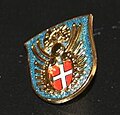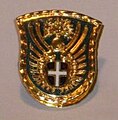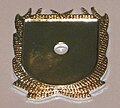
Princess Benedikte of Denmark, Princess of Sayn-Wittgenstein-Berleburg is a member of the Danish royal family. She is the second daughter and child of King Frederik IX and Queen Ingrid of Denmark. She is the younger sister of Queen Margrethe II of Denmark, and therefore the aunt of Margrethe's son, the current King of Denmark, Frederik X. She is also an older sister of Queen Anne-Marie of Greece.
The Combat Action Ribbon (CAR) is a United States Navy, United States Coast Guard, and United States Marine Corps military decoration awarded to United States sea service members "who have actively participated in ground or surface combat." Coast Guardsmen, Navy sailors, and Marines active in clandestine, stealth or special operations are deemed eligible for consideration of the award. The ribbon is awarded to members of the Navy and Marine Corps with a rank no higher than captain and colonel, respectively.

The awards and decorations of the United States Armed Forces include various medals, service ribbons, ribbon devices, and specific badges which recognize military service and personal accomplishments of members of the U.S. Armed Forces. Such awards are a means to outwardly display the highlights of a service member's career.

The Good Conduct Medal is one of the oldest military awards of the United States Armed Forces. The U.S. Navy's variant of the Good Conduct Medal was established in 1869, the Marine Corps version in 1896, the Coast Guard version in 1923, the Army version in 1941, and the Air Force version in 1963; the Air Force Good Conduct Medal was temporarily discontinued from February 2006 to February 2009, followed by its subsequent reinstatement.

The Order of the Dannebrog is a Danish order of chivalry instituted in 1671 by Christian V. Until 1808, membership in the Order was limited to fifty members of noble or royal rank, who formed a single class known as White Knights to distinguish them from the Blue Knights who were members of the Order of the Elephant. In 1808, the Order was reformed and divided into four classes. The statute of the Order was amended in 1951 by a Royal Ordinance so that both men and women could be members of the Order. Today, the Order of the Dannebrog is a means of honouring and rewarding the faithful servants of the modern Danish state for meritorious civil or military service, for a particular contribution to the arts, sciences or business life, or for working for Danish interests.

The Order of Orange-Nassau is a civil and military Dutch order of chivalry founded on 4 April 1892 by the queen regent, Emma of the Netherlands.

The Ohio Military Reserve (OHMR) is one of three separate components that make up the Ohio State Defense Force (SDF). Like other SDF's the Ohio Military Reserve functions as a reserve to the Ohio National Guard.

The Oklahoma National Guard, a division of the Oklahoma Military Department, is the component of the United States National Guard in the U.S. state of Oklahoma. It comprises both Army (OKARNG) and Air (OKANG) National Guard components. The Governor of Oklahoma is Commander-in-Chief of the Oklahoma National Guard when not on federal active duty. The state's highest-ranking military commander, the Adjutant General of Oklahoma (TAG), serves as the military head of the Guard and is second only to the Governor. The TAG is served by Assistant Adjutants General, all brigadier generals, from the OKARNG and OKANG. The two components each have a senior noncommissioned officer, State Command Sergeant Major for Army and State Command Chief Master Sergeant for Air. The TAG is also served by his Director of the Joint Staff or Chief of Staff, who has direct oversight of the state's full-time National Guard military personnel and civilian employees.

The Indiana Guard Reserve (IGR), formerly the Liberty Guard and the Indiana Legion, is the state defense force of the state of Indiana. The Indiana Guard Reserve serves under the exclusive authority of the governor of the State of Indiana through his executive agent for military matters, The Adjutant General of Indiana. The Guard Reserve is a unique military organization designed to supplement the Indiana National Guard and to defend Indiana if any part of the Indiana National Guard is in active federal service. The Indiana Guard Reserve also provides MEMS qualified soldiers who can augment Indiana Homeland Security missions and County Emergency Operations activities.

Dannebrogordenens Hæderstegn, also referred to as the Cross of Honour of the Order of the Dannebrog, is a meritous award connected to the Danish Order of the Dannebrog. The cross was instituted by King Frederick VI of Denmark and Norway on 28 June 1808, and was named Dannebrogsmændenes Hæderstegn (D.M.) until 1952.

The South Carolina State Guard (SCSG) is the designated state defense force for the state of South Carolina.
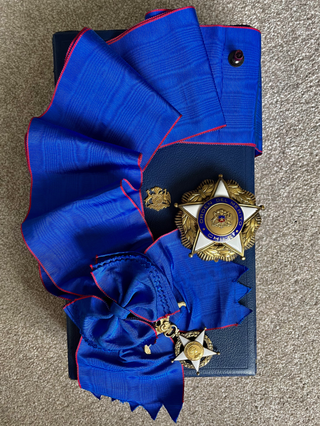
The Order of Merit is a Chilean order and was created in 1929. Succeeding the Medal of the Merit, which was created during the term of the President Germán Riesco through the Minister of War decree No. 1350 on 4 September 1906. This new national distinction was created to recognize the meritorious service provided by foreign military personnel to Chilean officials. The order is only awarded to foreigners.

The Badge of Honor of the League of Civil Defense was instituted in 1956 by King Frederik IX and may be awarded to persons who have done noteworthy deeds for the Civil Defense cause, over a prolonged period of time . The medal is awarded by the President of the Danish Civil Defense Association, Beredskabsforbundet.

The award system of Denmark, and especially the regulations for who is allowed to wear which medals, is one of great variation. The current honour-system has been created one step at a time since the 16th century. The system consists of royal orders and medals, official/governmental medals and some few private medals that have been approved by the monarch.

The Bangladesh Armed Forces award medals and their associated ribbon bars in recognition of various levels of service, personal accomplishments and commemorative events while a regular serviceperson is a member of the Bangladesh Army, Bangladesh Navy and the Bangladesh Air Force. Together with military badges, such awards are a means to outwardly display the highlights of a serviceperson's career.
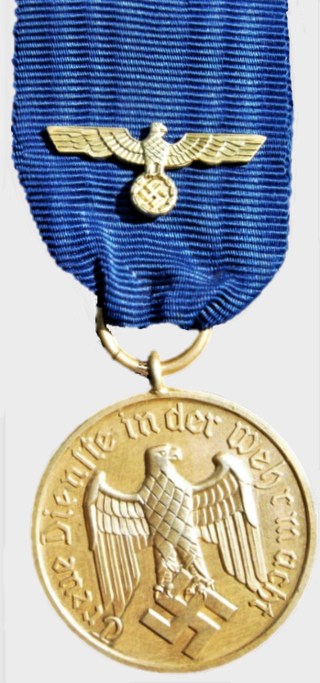
The Wehrmacht Long Service Award was a military service decoration of Nazi Germany issued for satisfactory completion of a number of years in military service.

Melbourne Kimsey was a brigadier general in the United States Air Force who served as director of the Cheyenne Mountain Complex from 1981 to 1983,
The Home Guard Bronze Medal is a Swedish reward medal established in 2006 by the National Home Guard Council (Rikshemvärnsrådet). It is awarded for valuable service contributed to the development of the Home Guard.
The Home Guard Service Medal is a service medal awarded by the Swedish Home Guard. The award is given to Home Guard soldiers, Home Guard musicians and volunteer staff with a valid Home Guard contract and to those who remain in the Home Guard as a Home Guard veteran. The medal is made of three denominations: silver, gold and gold with enamel.


![]()
![]()
![]()
![]()
![]()
![]()


